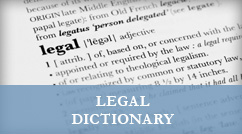A
- Affidavit – A written statement sworn to be true. The individual providing the affidavit must sign the document and swear under oath before a notary public or make a declaration under penalty of perjury.
- American Bar Association (ABA) – The ABA is the predominant professional association for attorneys practicing in the United States. The ABA actively influences legal policy, lobbies for the legal profession, and evaluates legal professionals.
- Arbitration – Arbitration is a method for disposing of legal disputes without a formal court trial. All parties to the dispute consent to having their case heard before a panel of independent experts. The parties must also agree to be subject to the panel’s rulings.
- Asbestos Lawsuit – A claim alleging injury, typically arising from a cancer called mesothelioma, stemming from exposure to asbestos. Asbestos lawsuits include personal injury suits brought directly by the party exposed to asbestos and wrongful death suits brought by the families of those who have died from exposure.
- Attorney – Any individual authorized by a state or federal court to practice law.
B
- Bar Examination – A state examination that is prerequisite to practicing law in the state.
- Beneficiary – An individual entitled to receive property or benefits in a will or trust.
- Bill of Particulars – A statement of the details of the charge made against the defendant.
- Breach of Contract – The failure to perform a duty when performance is due.
- Brief – A party’s written argument, or memorandum of law, in a case that typically contains a summary of the facts, pertinent laws, and an argument of how the law favors the party under the particular circumstances.
C
- Casuality – An accident, especially one involving serious injury or loss of life.
- Civil Law – Law involving non-criminal cases. Personal injury claims, family law disputes, and contract disputes are civil law matters.
- Co-Defendant – One of multiple parties defending against a claim in a lawsuit.
- Common Law – A body of law developed in the doctrine of the judicial branch of government. The common law system is rooted in the medieval English court system and is still very much a part of modern American jurisprudence.
- Comparative Negligence – A method of assigning negligence among multiple parties. Comparative negligence considers all parties whose negligence contributed to a tort. The negligence is then allocated among the parties at fault and damages are assigned proportionately.
- Complaint – The legal document, also called a claim, which is filed with a court that formally initiates a lawsuit.
- Contingent Fee – An agreement between a lawyer and a client whereby the lawyer is paid a percentage of the damages awarded if the client is awarded damages in the lawsuit.
- Contributory Negligence – A method for assigning negligence that considers behavior by the plaintiff that contributes to the resulting harm. At common law, any degree of contributory negligence bars the plaintiff from collecting damages.
- Court Trial – A trial heard before a judge, as opposed to a jury trial that is heard before a judge and a jury.
- Criminal Law – The body of law involving cases where the defendant faces criminal sanctions such as incarceration.
D
- Damages – Monetary awards ordered to be paid as compensation for injury or loss.
- Default Judgment – A ruling issued in the plaintiff’s favor when the defendant fails to respond to a complaint in a timely manner.
- Defendant – The person alleged to have caused the injury.
- Deposition – A discovery procedure in which the lawyers representing the parties in a lawsuit question the opposing parties and witnesses.
- Discovery – Formal procedures that allow the parties in a lawsuit to obtain information and evidence from one another and from witnesses. Deposing witnesses, drafting interrogatories, making requests for production of documents, and demanding independent medical examinations are common discovery procedures.
- Drunk Driving – Referred to as driving while intoxicated (DWI), driving under the influence (DUI), operating under the influence (OUI). DWI, DUI, and OUI laws are aimed to prevent motorists from operating vehicles while they are under the influence of alcohol and/or drugs. A motorist is considered unlawfully “intoxicated” when they exhibit a blood alcohol concentration above a limit set in statute.




